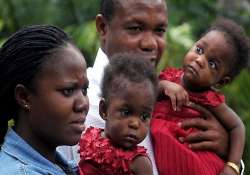Nigerian conjoined twins get new lease of life in India
New Delhi: For the Nigerian parents of conjoined twins Hussaina and Hassana Badaru, watching their daughters celebrate their first birthday together after a successful separation surgery is nothing short of miracle and they have a

New Delhi: For the Nigerian parents of conjoined twins Hussaina and Hassana Badaru, watching their daughters celebrate their first birthday together after a successful separation surgery is nothing short of miracle and they have a team of Indian doctors to thank for it.
Experts in Nigeria had given up hope of saving both the girls in case of separation surgery that was needed to give them a normal life.
The twins shared their spinal cords, lower intestinal tract and genitourinary tracts. This meant that they had one common passage for fecal matter and another one for passing urine.
Their parents got to know about such surgeries being successfully carried out in India. The twins were 7-months old when they were brought to BLK SSH hospital here. “Separation of the Badaru twins was a big challenge as they had unusual sharing of alimentary canal, genitourinary system and nervous system. Rehearsals were carried out using dummies. Every surgical step was defined and rehearsed over and over again till it reached precision,” said Dr Prashant Jain, Consultant, Pediatric Surgery.
He said if not meticulously planned, the success rate in such cases is just 30 per cent.
A team involving 10 super specialities were formed to do the separation in three stages. The surgery lasted for about 13 hours after which the girls were moved to separate OTs to carry out further reconstruction.
“In the first stage, tissue expanders were placed to get adequate skin for covering the wounds after separation. Tissue expanders are essentially silicon bags which are gradually inflated with saline placed under the skin on the buttocks. “By pumping in saline over a period of two months the tissue expanders were gradually inflated once a week. This helped in expansion of the skin and generation of good tissue cover,” Jain said.
This was followed by the actual separation of the spinal cords, intestine and genitourinary tract which was carried out along with the reconstruction.
In the same stage, a temporary passage for fecal matter was created in the sisters' abdomen which will be closed after two months.
“The girls were colour coded (one pink and the other blue) for eight days before the surgery so that there would be no error at all. All tubes, wires, catheters, leads, syringes, injections and drugs were also colour coded in accordance with the pink or blue code to avoid any error or miscalculation,” he said.
Dr A K Bath, Plastic and Reconstructive Surgeon, constructed a new genitourinary tract with new genitalia for each of the girls. Their intestines were repaired with separate anal openings.
“It took five hours of nerve wracking work, but now the girls will appear absolutely normal externally as well,” said Bath.
Both the siblings are now stable and have shown no signs of any neurological deficit.
Experts in Nigeria had given up hope of saving both the girls in case of separation surgery that was needed to give them a normal life.
The twins shared their spinal cords, lower intestinal tract and genitourinary tracts. This meant that they had one common passage for fecal matter and another one for passing urine.
Their parents got to know about such surgeries being successfully carried out in India. The twins were 7-months old when they were brought to BLK SSH hospital here. “Separation of the Badaru twins was a big challenge as they had unusual sharing of alimentary canal, genitourinary system and nervous system. Rehearsals were carried out using dummies. Every surgical step was defined and rehearsed over and over again till it reached precision,” said Dr Prashant Jain, Consultant, Pediatric Surgery.
He said if not meticulously planned, the success rate in such cases is just 30 per cent.
A team involving 10 super specialities were formed to do the separation in three stages. The surgery lasted for about 13 hours after which the girls were moved to separate OTs to carry out further reconstruction.
“In the first stage, tissue expanders were placed to get adequate skin for covering the wounds after separation. Tissue expanders are essentially silicon bags which are gradually inflated with saline placed under the skin on the buttocks. “By pumping in saline over a period of two months the tissue expanders were gradually inflated once a week. This helped in expansion of the skin and generation of good tissue cover,” Jain said.
This was followed by the actual separation of the spinal cords, intestine and genitourinary tract which was carried out along with the reconstruction.
In the same stage, a temporary passage for fecal matter was created in the sisters' abdomen which will be closed after two months.
“The girls were colour coded (one pink and the other blue) for eight days before the surgery so that there would be no error at all. All tubes, wires, catheters, leads, syringes, injections and drugs were also colour coded in accordance with the pink or blue code to avoid any error or miscalculation,” he said.
Dr A K Bath, Plastic and Reconstructive Surgeon, constructed a new genitourinary tract with new genitalia for each of the girls. Their intestines were repaired with separate anal openings.
“It took five hours of nerve wracking work, but now the girls will appear absolutely normal externally as well,” said Bath.
Both the siblings are now stable and have shown no signs of any neurological deficit.